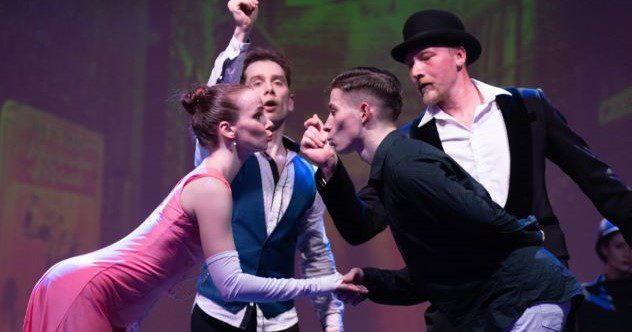[ad_1]

Musical theater can be a magical thing for a child. The first time they see Wicked’s Elphaba rise to the top of the theater, or the chandelier come crashing down in Phantom, can be a memory they’ll never forget.
Of course, some shows might not make such a great impact. Occasionally, parents have a tendency to make rash decisions, and some of those end up turning into nights at the theater with kids, watching shows they probably shouldn’t be seeing.
These shows aren’t necessarily bad for children to see. Still, because of something—its title, famous song, etc.—parents may be misled into believing the musical is something it’s not. And that can lead to an uncomfortable performance for all involved.
So let’s head backstage and look at ten Broadway musicals that aren’t the ones you want your kids watching.
Related: Top 10 Broadway Musicals You’ve Never Heard Of
10 Cats
Although it’s one of the most famous musicals of all time, it might not be the best way to introduce your child to the world of theater.
Cats has a famously convoluted plot that may be difficult for most kids to understand. (I’m 23 and barely understand it myself.) In general, the idea is that a group of cats in London are each competing to go to the Heaviside Layer, which is their version of heaven.
Although the show can certainly be a lot of fun, it’s quite confusing, and a child may not understand what’s happening. To top it off, in an effort to transport the audience from a theater to this magical world where cats seem to rule the earth, most productions utilize heavy makeup and interact with the audience when they can, which can be… unsettling, to say the least.[1]
9 Spring Awakening
The original Broadway production of Spring Awakening starred Jonathon Groff and Lea Michele, both cast members of the hit TV series Glee. Although Glee isn’t necessarily a show for children, it was popular with tweens upon its first release and remains so today.
Naturally, these tweens might find themselves drawn to a Broadway musical that featured both Groff and Michele, but Spring Awakening may not be the best idea. Based on the play of the same name from the 1890s, the show is about a young girl (played by Michele) who is raped by a boy (played by Groff). She becomes pregnant and must get a botched abortion, which ends up killing her.
Side plots include incest and sexual abuse from parents, as well as suicide: Pretty far from Groff and Michele’s time on Glee, when they just had to worry about their glee club making it to nationals.[2]
8 Hair
Along with Cats, Hair is one of the most pivotal and famous musicals of all time. But despite this distinction, few people know much about the actual plot. It’s not just zany singers in wigs: The show is a political art piece criticizing war—the Vietnam War specifically.
Our main characters do drugs, have sex, and swear throughout the entire show. It is integral to the plot, which aims to show what hippie tribes were really doing and talking about during the age of Flower Power.
But the main reason parents should try to steer clear of Hair is one particular scene in which the actors are presented fully nude. This might not be a big deal to some families, but it’s definitely something to be aware of before bringing the kids (or the in-laws!).[3]
7 Parade
Don’t let the name fool you: Parade is not a lighthearted night at the theater.
The titular parade isn’t the fun-filled extravaganza you’d expect. Rather, it refers to the parade that the people of Atlanta, Georgia, plan to throw once Leo Frank is hanged for raping and murdering a young girl.
Based on true historical events, Parade follows Frank as he’s accused of this heinous crime and the gross injustice that follows. Besides the devastating story of Mary Phagan, the girl who’s been murdered, Parade also takes a look at the extreme anti-Semitism that caused Frank to be accused and his trial to be sensationalized and botched.
All in all, this is one of the heaviest and most heart-wrenching shows to be mounted on the Great White Way and one that adults still have trouble fully comprehending. Anyone who’s done a bit of research on the show would know that going in, but if someone’s bought tickets based on the title alone… good luck.[4]
6 West Side Story
I know, it’s almost sacrilegious to say that the iconic West Side Story isn’t great for young ones, but it’s true.
Plenty of kids’ media is based on Shakespeare. Take Gnomeo and Juliet, for example. But while Gnomeo and Juliet takes Shakespeare’s tragedy and turns it into a garden trinket-themed farce, West Side Story somehow makes it even more violent.
Everyone knows the main songs from the show: “Maria,” “One Hand, One Heart,” and “I Feel Pretty.” These songs may seem hopeful and innocent, but the plot is not. The love story is only one part of the show, as the rivalry between the Jets and the Sharks results in extreme racism and violence, culminating with the violent death of the protagonist. And that’s not even mentioning the several references to rape, including one where the beloved character Anita is almost sexually attacked by the Jets.
So maybe stick with the gnome version for the first few years.[5]
5 Fun Home
Yet another misleading title.
The “fun home” in question is short for a funeral home, where the main character, Alison, lives with her brothers and parents.
This musical is a biography of writer and artist Alison Bechdel. Today, she’s a lesbian icon, but in her youth, she was just a young girl struggling with her sexuality.
She and her brothers romp around the funeral home, playfully introducing the audience to aneurysm hooks and smelling salts. And while there are some sexual overtones from Alison’s first girlfriend, It’s not the fun home or sex that makes this show a little too adult for young ones.
Turns out Alison’s father is also struggling with his sexuality and deals with it by going out cruising and hooking up with barely legal men. Alison tries in vain to get her father to both accept her and himself, but in the end, he chooses suicide over facing the truth.
Not very fun. [6]
4 Oliver!
Don’t let the exclamation point fool you: Oliver! is no walk in the park.
People often assume this adaption of Dickens’s Oliver Twist is a children’s show. It’s an easy mistake to make, considering the show is named after a young boy, and much of the cast is made up of children. And I’m not saying that children don’t enjoy or shouldn’t see Oliver!—just that some people may not be aware of how dark the content truly is.
The plot follows Oliver, abandoned at birth, as he weaves his way through Victorian London. The original book was written as a critique to show how horribly poor people and orphans lived on the streets in those days, and it certainly shows. Oliver is put through trials and tribulations, such as being kept in a coffin, being sold to whoever wants him, and eventually surviving a brutal murder attempt.
Nancy, a prostitute, is one of the only true friends Oliver makes in his time on the streets. So, of course, she winds up brutally murdered by her boyfriend, leaving Oliver alone to grieve at the end of the show.[7]
3 The 25th Annual Putnam County Spelling Bee
There’s a reason the kids are played by adults in this one.
This musical focuses on a group of children who are brought together by, you guessed it, a spelling bee. Each one loves spelling, and each has a reason for why they absolutely need to win.
Although the show starts off fairly tame, with the kids arguing about the difficulty of spelling and getting to know each other, it quickly takes a darker turn. From learning that one child’s family openly mocks him for his stupidity to two girls breaking down over the pressure they face at home and from school, Putnam’s characters become three-dimensional faster than you can spell “character development.”
When contestant Olive is asked to spell the word “chimerical,” which means wildly fanciful, she begins a daydream song in which her parents repeat “I love you” and apologize for abandoning her. At the end, of course, her parents (who did not come to the bee) fade away, leaving her alone onstage after one of the most heartbreaking songs in musical theater. It is during this song that the audience also learns Olive may be being abused by her father at home.
But don’t worry, it’s not all sad. Just look at the Act 2 opener: “My Unfortunate Erection.”[8]
2 Into the Woods
Into the Woods might be fine for kids as long as you leave after Act I. In fact, this is so true that the officially licensed “junior” version of the show only includes the first hour and a half.
Anyone familiar with Stephen Sondheim’s other works would know that he generally writes complicated plays that tackle intimate issues that children wouldn’t find particularly interesting. To be fair, though, with main characters like Little Red Riding Hood, Cinderella, Prince Charming, and Rapunzel, it’s easy to see why parents take their kids along to see Into the Woods.
There’s nothing that necessarily makes Into the Woods inappropriate, per se. No foul language or graphic scenes of violence or sex. But unless your kids are mature enough to watch Prince Charming cheat on Cinderella and Red Riding Hood’s mother die, it’s best to steer clear.
It’s a fairy tale with no happy ending and some lessons that are hard to swallow no matter how old you are.[9]
1 Avenue Q
Much like cartoons, puppetry has become nearly exclusively associated with children’s entertainment. But as TV shows like South Park have shown us, animation can be very adult.
Avenue Q is to puppets what The Simpsons was to TV: Proof that any art form can be made for grown-ups. With cuddly, fuzzy main characters splashed across advertisements, it’s an easy mistake for parents to think Avenue Q is a family-friendly Sesame Street-type of show. Which it is… in a way.
But instead of teaching kids to tie their shoes and count to ten, this musical instructs adults what to do with a useless college degree, how to use the internet to find porn, and how to address your roommate’s sexuality. The show is a satire of Sesame Street, but unfortunately, not everyone does their homework before seeing a show. So many parents have unsuspectingly brought children that the official website of the original Broadway production had to add a disclaimer that young children should not attend.[10]
[ad_2]
Source link

